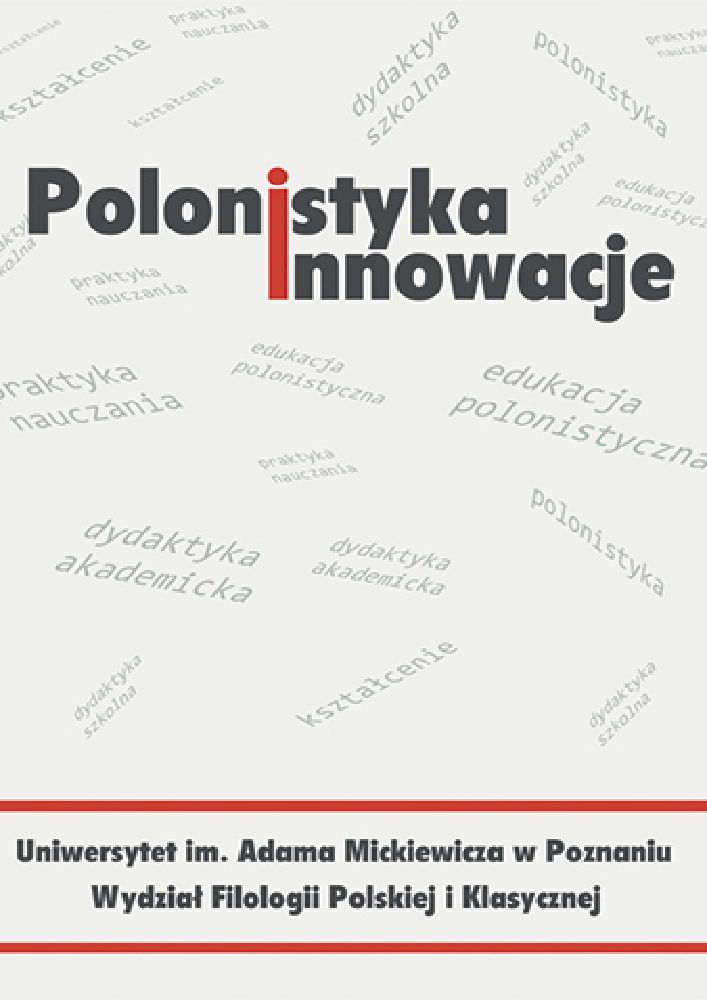Abstract
The article discusses the relation between knowledge and skills in the core curriculum in history. It begins with the analysis of how the popularity of certain concepts in didactics (e.g. working with source texts) leads to illusory changes in teaching, when introduced unawarely of their real meaning. In this account it is then considered how the belief that skills are more important than knowledge has emerged. Young and Muller’s concept of “three futures” and the notion of powerful knowledge are presented. The author argues that the violent dispute between the educational traditionalists and progressivists leads to the loss of the important truth about the inseparable connection between knowledge and skills. At the same time he attempts to show the application of the concept of powerful knowledge in the practice of writing the curriculum. The article ends with the presentation of the author’s vision of how to select pieces of knowledge and skills to be included in the core curriculum. Knowledge about writing history, history of second degree and shaping the sociological imagination are the main criteria of this selection.
References
Biedrzycki Krzysztof, 2020, Propozycja podstawy programowej do języka polskiego, Polonistyka. Innowacje”, (12), 248-295.
Biesta Gert, Priestley Mark, 2013, Capacities and the Curriculum, w: Priestley M., Biesta G. (ed.), Reinventing the Curriculum. New Trends in Curriculum Policy and Practice, London – New Delhi – New York – Sydney.
Biesta Gert, 2013, The Beatiful Risk of Education, New York.
Biesta Gert, 2021, The three gifts of teaching: Towards a non-egological future for moral education, w: Journal of Moral Education, vol. 50, 2012, issue 1, s. 39-54.
Burszta Wojciech Józef, Dobrosielski Paweł, Jaskułowski Krzysztof, Majbroda, Katarzyna, Majewski Piotr, Rauszer Michał, 2020, Naród w szkole. Historia i nacjonalizm w polskiej edukacji szkolnej, Gdańsk.
Chapman Arthur, 2021, Introduction: Historical knowing and the ‘knowledgeturn’, w: Chapman A. (ed.), Knowing History in Schools: Powerful knowledge and the powers of knowledge, London.
Collingwood Robin George, 1994, The Idea of History, Oxford, NewYork.
Counsell Christine, 2016, History Teacher Publication and the Curricular ‘What?’: Mobilizing Subject-specific Professional Knowledge in a Culture of Genericism, w: Counsell Ch., Burn K., Chapman A. (eds.), Master Class in History Education. Transforming Teaching and Learning, London – Oxford – New York – New Delhi – Sydney.
Deakin-Crick Ruth, 2008, Key competencies for education in a European context, European Educational Research Journal, 7, 311–18.
Domański Juliusz, 2002, Tekst jako uobecnienie. Szkic z dziejów myśli o piśmie i książce, Kęty.
Dudzikowa Maria, Knasiecka-Falbierska Karina, 2013, Sprawcy i/lub ofiary działań pozornych w edukacji szkolnej, Kraków.
Informator o egzaminie maturalnym z historii od roku szkolnego 2022/2023, 2021, Warszawa.
Jablonka Ivan, 2018, History is a contemporary literature: manifesto for the social sciences, Ithacaand London.
Kędzierski Jerzy Zdzisław (oprac.), 1963, Współcześni historycy brytyjscy. Wybór z pism, Londyn.
Kitson Alison, 2021, How helpful is the theory of powerful knowledge for history educators?, w: Chapman A. (ed.), Knowing History in Schools: Powerful knowledge and the powers of knowledge, London.
Kończał Kornelia, 2014, Miejsce pamięci, w: Saryusz-Wolska M., Traba R. (red.), Kalicka J. (wsp.), Modi memorandi. Leksykon kultury pamięci, Warszawa.
Kuukkanen Jouni-Matti, 2015, Postnarrativist Philosophy of Historiography, London.
Lindqvist Sven, 1979, Dig Where You Stand, Oral History, vol. 7, no. 2 (Autumn, 1979), s. 24-30.
Maude Alaric, 2015, What is powerful knowledge and can it be found in the Australian geography curriculum?, Geographical Education, vol. 28, s. 18-26.
McTighe Jay, Silver Harvey, 2021, Uczyć (się) głębiej. Jak to zrobić na lekcji, Warszawa.
Mills Charles Wright, 2008, Wyobraźnia socjologiczna, Warszawa.
Najder Zdzisław, Machcewicz Anna, Kopczyński Michał, Kuźniar Roman, Sienkiewicz Bartłomiej, Stępień Jerzy, Włodarczyk Wojciech (red.), 2014, Węzły pamięci niepodległej Polski, Warszawa.
Nowak Andrzej W., 2011, Podmiot, system, nowoczesność, Poznań.
Popkewitz Thomas S., 1980, Global Education as a Slogan System, Curriculum Inquiry, Autumn, vol. 10, no. 3, s. 303-316.
Puustinen Mikko, Khawaja Amna, 2021, Envisaging the alternatives: from knowledge of the powerful to powerful knowledge in history classrooms, Journal of Curriculum Studies, 53:1, s. 16-31.
Seixas Peter, 2019, Foreword: History Educators in a New Era, w: Metzger S.A., McArthur Harris L. (eds), 2018, The Wiley International Handbook of History Teaching and Learning, Hoboken, s. XIII-XVIII.
Szkoła Edukacji, 2021, Program studiów, https://szkolaedukacji.pl/wp-content/uploads/2021/07/program_studiow.pdf (dostęp: 10.01.2022).
van Boxtel Carla, van Drie Jannet, 2018, Historical reasoning: Conceptualizations and educational applications, w: Metzger S.A., McArthur Harris L. (eds), The Wiley International Handbook of History Teaching and Learning, Hoboken, s. 149-176.
White John, 2018, The weakness of “powerful knowledge”, London Review of Education, 16 (2), s. 325–335.
Willingham Daniel T., 2007, Critical Thinking. Why Is It So Hard to Teach?, American Educator, Summer 2007.
Wineburg Sam, 2001, Historical thinking and other unnatural acts: charting the future of teaching the past, Philadelphia.
Young Michel, Muller Johan, 2010, Three Educational Scenarios for the Future: lessons from the sociology of knowledge, European Journal of Education, 45 (1), s. 11–27.
Young Michel, 2013, Powerful knowledge: analytically useful conceptor just a “sexy sounding term”? A response to John Beck’s “Powerful knowledge, esoteric knowledge, curriculum knowledge”, Cambridge Journal of Education, 43, s. 195–198.
Young Michel, 2014, Powerful knowledge as a curriculum principle, w: Young M., Lambert D., Roberts C. & Roberts M., Knowledge and the future school: curriculum and social justice, London, s. 65–88.

